Legendary Nevadans: Jessie Beck
Fall 2022
A down-on-her-luck Texas cashier becomes one of Reno’s most celebrated residents.
BY CORY MUNSON
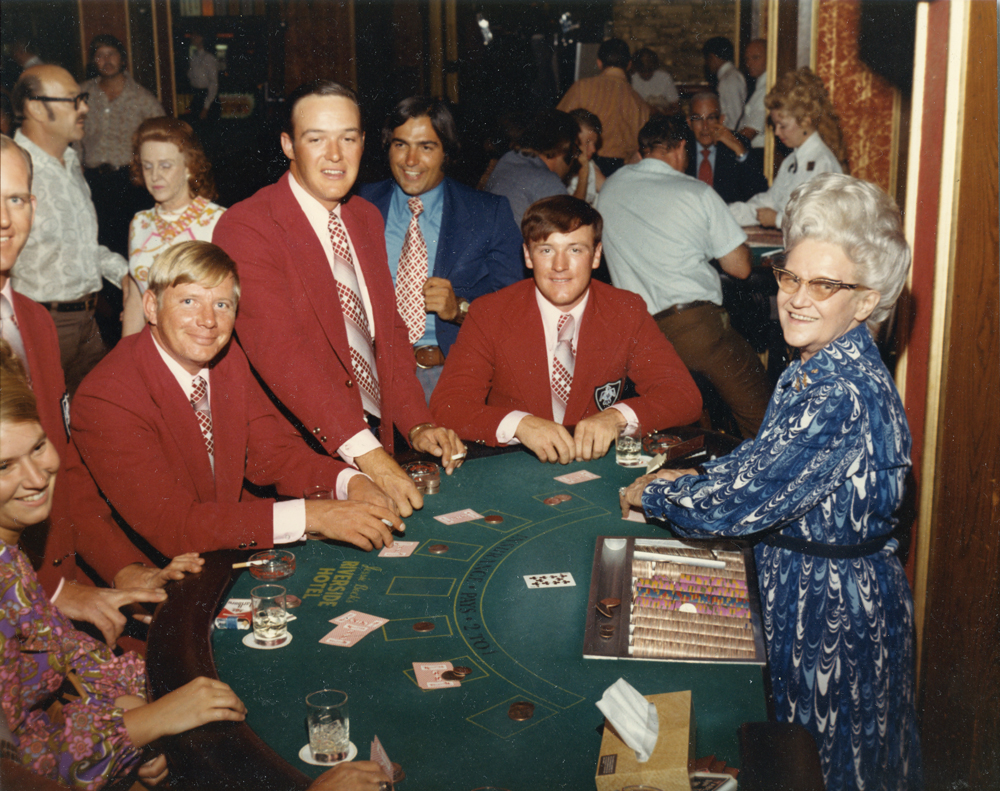
From adventurers and gunslingers to writers and thinkers, Nevada’s history was shaped by individuals with grit and drive. Each issue, we look at one of these notable heroes from the past. Whether born or raised, these aren’t just Nevadans: they’re Legendary Nevadans.
At 34 years old, Jessie Beck (born Jessie Renfro) found herself recently divorced and nearly broke. Opportunities for a single mother in 1938 were few, so she was relieved to find work at a diner in Fort Worth.
A few months into the job, Beck’s sister Mabel and brother-in-law Raymond “Pappy” Smith entered the restaurant. The two had just arrived from Reno, where Pappy managed the Harolds Club casino.
After they finished their meal, Pappy went to the register to pay. To his surprise, his sister-in-law calculated his bill—including tax—without any pen or paper. He offered her a job on the spot, saying anyone that good with numbers belonged in the casino business.
Beck said she didn’t know much about gambling, but if Pappy was offering her a fresh start, she would take it.
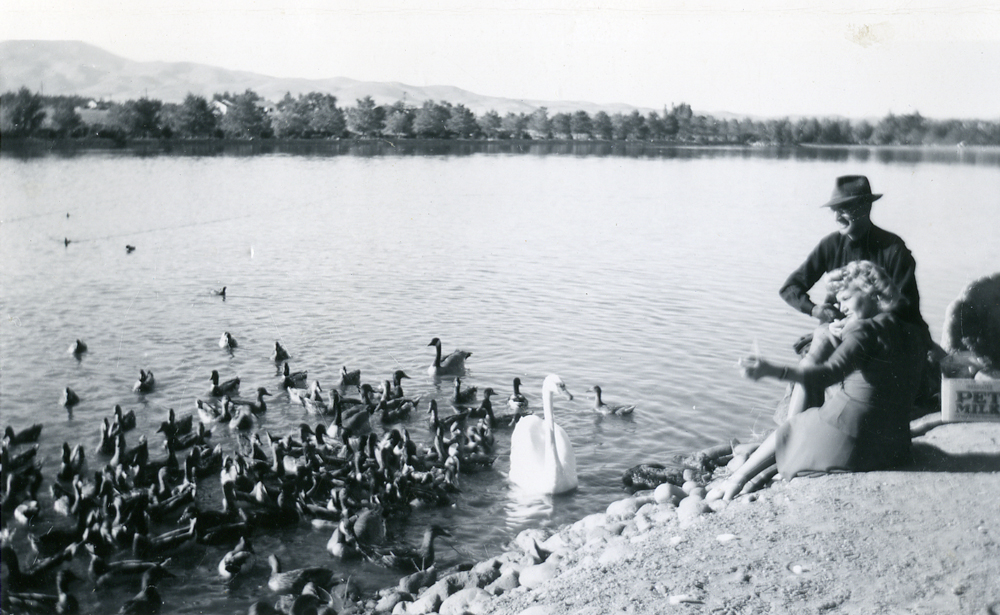
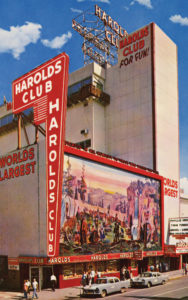
HAROLDS CLUB
A few weeks later, Beck was in Reno. Pappy started her on the roulette table, and her charm and wit soon made her a customer favorite. When a craps dealer got appendicitis, Beck filled in, becoming the first woman dealer in the state. Within a year, she was running the head craps table.
In 1941, Beck was injured in a car accident. She wouldn’t be able to stand for months, and that meant no more dealing craps. As she recovered in the hospital, she asked her nurse for a deck of cards: she was going to teach herself to deal blackjack.
Beck returned to work and was assigned cashier desk duty. She asked instead to be made a blackjack dealer. After demonstrating her newfound skill, the request was granted.
Beck dealt blackjack throughout the 1940s. During this time, she shot up the casino ranks, earning a string of promotions—first to night shift floor manager, and then to supervisor.
In 1951, she married an old friend of Pappy’s named Fred Beck. Fred owned his own poker, horseracing, and keno concessions at Harolds Club. Unfortunately, the marriage was short lived. Fred Beck died in 1954, and Jessie Beck took over management of her late husband’s casino games, running the Beck Corporation for the next 16 years.
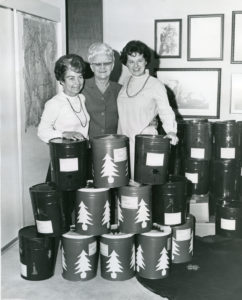
THOSE BOYS NEED MAIL
In the early 1960s, Beck befriended a young kitchen worker named Richard Perry. Born and raised in Carlin, Perry moved to Reno for college and worked at Harolds Club to pay for tuition. The two became fast friends, Perry even referring to Beck as his work mother.
At the onset of the Vietnam War, Perry left Reno to join the Navy. Bright, gregarious, and a gifted aviator, Perry soon became lead pilot of Naval Squadron 164 (VA-164).
Beck and Perry kept in close contact by mail. In 1965, Perry wrote her, saying his fellow servicemen were lonely and missing home. Worse, many weren’t receiving any letters or packages. Beck had already been sending Perry care packages, but after learning about the plight of the young men in Vietnam, she ramped up her operation.
The first care package addressed to squadron VA-164 was a large box of ballpoint pens, a luxury for ship-bound servicemen. The boys were so delighted that she sent more packages, not only to VA-164, but to their fellow squadrons and to servicemen in other branches. Soon hundreds of men were rushing to mail call, delighted to find games, playing cards, books, magazines, and toiletries.
Throughout the war, Beck spent her evenings at home penning letters to the men. By the late 1960s, she had 500 men on her mailing list and was receiving dozens of letters a day. Eventually, she moved to sending out a newsletter with a personalized postscript.
When asked of her efforts, Beck humbly replied that the number one thing the boys in Vietnam needed was mail. In all, Beck befriended more than 2,000 servicemen.
LADY JESSIE

In 1967, Perry renamed the squadron’s lead plane to honor his friend. The A-4E Skyhawk now bore the name Lady Jessie.
On Aug. 31, 1967, tragedy struck. Shortly after taking off, Perry’s plane was hit by fire from the coast. He ejected and deployed his parachute, but he had suffered a fatal wound. Perry’s death was a terrible loss for all who knew him. Today, a bronze plaque dedicated to him can be found in Carlin at Richard C. Perry Memorial Park.
The squadron’s new lead plane was also named Lady Jessie, and each following plane would carry that name for the rest of the war.
Beck’s work garnered local and national attention. In 1968, she received the Award of Merit from the Department of Defense—the highest medal for a civilian—and in 1969, Nevada Governor Paul Laxalt named her a distinguished Nevadan.
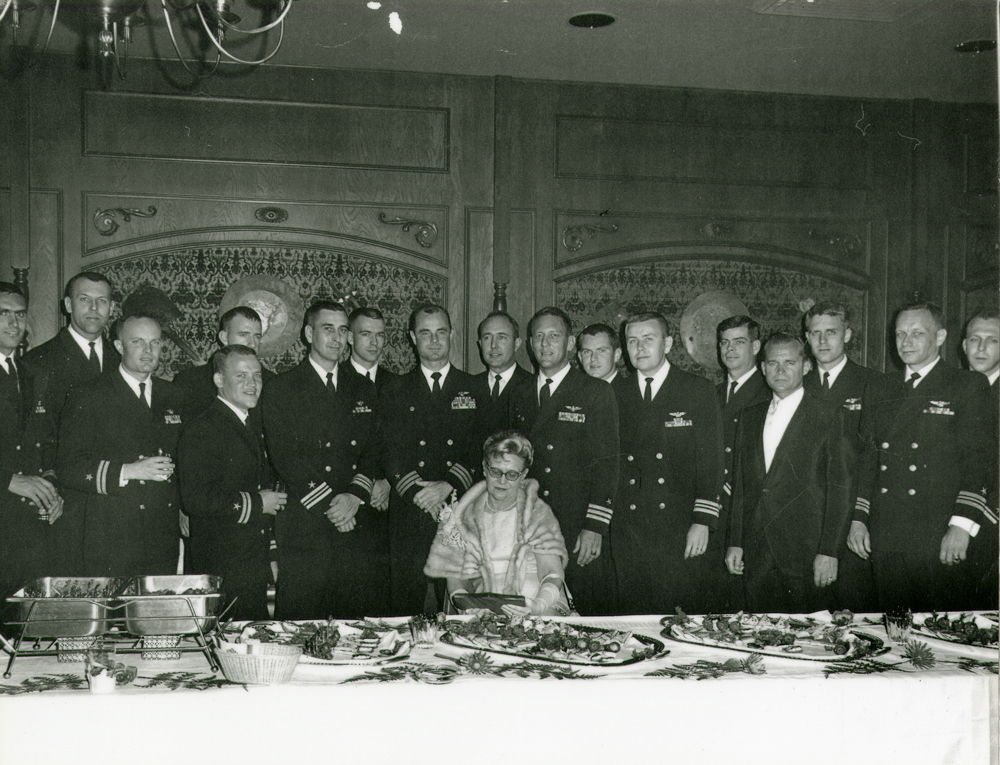
BECK V. HUGHES
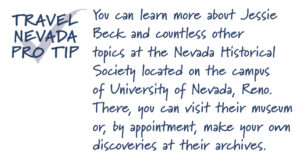 In June 1970, Harolds Club was bought by Howard Hughes for $11.5 million. The eccentric millionaire already owned six casinos in Las Vegas, and this purchase would cement his presence in northwestern Nevada.
In June 1970, Harolds Club was bought by Howard Hughes for $11.5 million. The eccentric millionaire already owned six casinos in Las Vegas, and this purchase would cement his presence in northwestern Nevada.
Before the acquisition, Beck Corporation owned concessions at Harold’s Club, meaning it rented floor space from the casino but kept the proceeds. Hughes wanted to dissolve all independent casino concessions and centralize control over all operations. Beck, 65, had been running her own games for nearly 20 years, but now she was being evicted.
She needed time to negotiate her position, so she directed her lawyer, Peter Echeverria, to appeal to the Nevada Gaming Commission for a delay in the casino’s sale.
“To Hughes, this is just another step into the state, to Harold’s Club this is just another incident in a colorful past, but to Mrs. Beck, this represents 31 years of her life,” said Echeverria. The request was denied.
Hughes’ attorneys had one offer for Beck: give up the concessions within 10 days and receive $175,000—three times their value, they claimed. For every day she didn’t decide, $8,000 would be taken off the sale. Beck saw through the intimidation tactic, responding that her keno games alone netted $3 million in 1969 and her equipment was valued at half a million dollars.
Beck threatened to force the sale into a lengthy trial that would bring bad press to the Hughes’ gaming empire. His attorneys finally accepted her counteroffer, and Beck took home $3 million.
THE GAMBLING GRANDMA
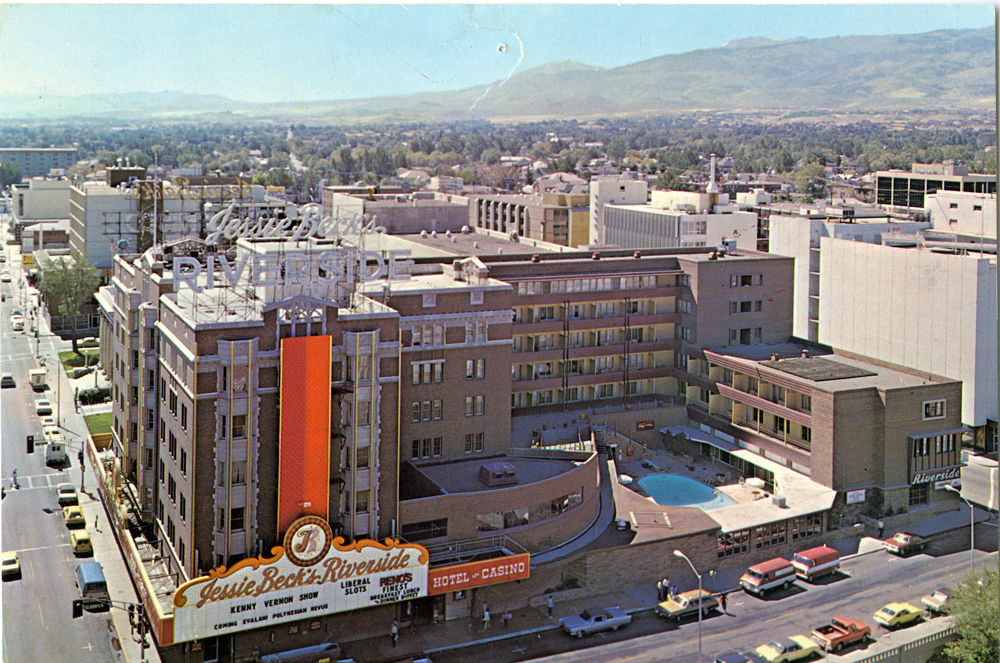
After the buyout, friends told Beck to retire and travel the world; she was nearing 70 and had enjoyed a great career. Beck planned on staying busy, however, and she now eyed the Riverside Hotel.
The brick building on the banks of the Truckee River was one of Reno’s most famous buildings, and it had been vacant for more than three years. Over the past 15 years, the hotel passed through 13 different owners: a series of grand openings followed by shuttered doors. It seemed like no one could get the hotel running again.
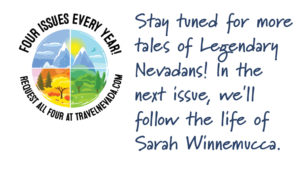 “(Buying the Riverside) was the biggest gamble of my life. Nobody has made a success here since the 1940s,” Beck told the Reno Gazette Journal, but she went ahead with the $3.15 million purchase anyway. In 1971, the old building became Jessie Beck’s Riverside, and it was an immediate hit.
“(Buying the Riverside) was the biggest gamble of my life. Nobody has made a success here since the 1940s,” Beck told the Reno Gazette Journal, but she went ahead with the $3.15 million purchase anyway. In 1971, the old building became Jessie Beck’s Riverside, and it was an immediate hit.
The hotel opened with nine tables and 100 slot machines—nine from Beck’s personal collection. By the end of the year, the 188-room hotel was fully booked each weekend. Lines at the slot machines prompted Beck to expand, and soon they doubled the number of games. Beck, now a media darling, earned the moniker “The Gambling Grandma.”
To Beck, the casino was her life. During the day, she was often found handing out meal tickets, dealing cards, and sometimes doubling down on guest’s bets. After a long shift, she would wander the floor to visit with guests, sometimes until 3 in the morning. Then, instead of returning home, she would go upstairs to her room at the Riverside to sleep.
Beck ran her casino for 15 years before finally retiring in 1986 at the age of 83. The young woman from Texas who restarted life in Nevada had become an adored socialite, a successful business owner, and a passionate philanthropist. And now, she had earned her rest.


